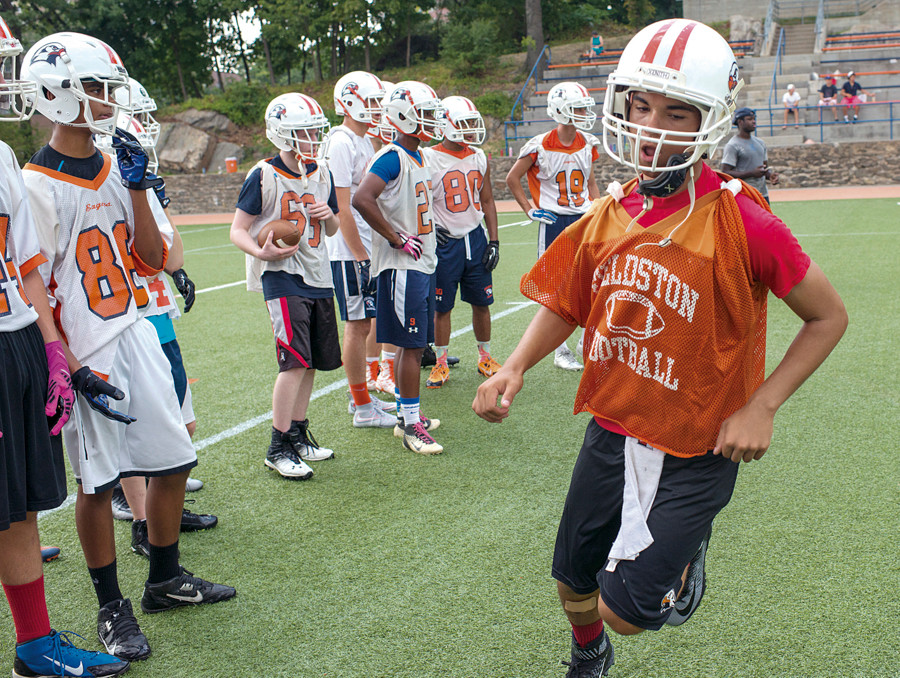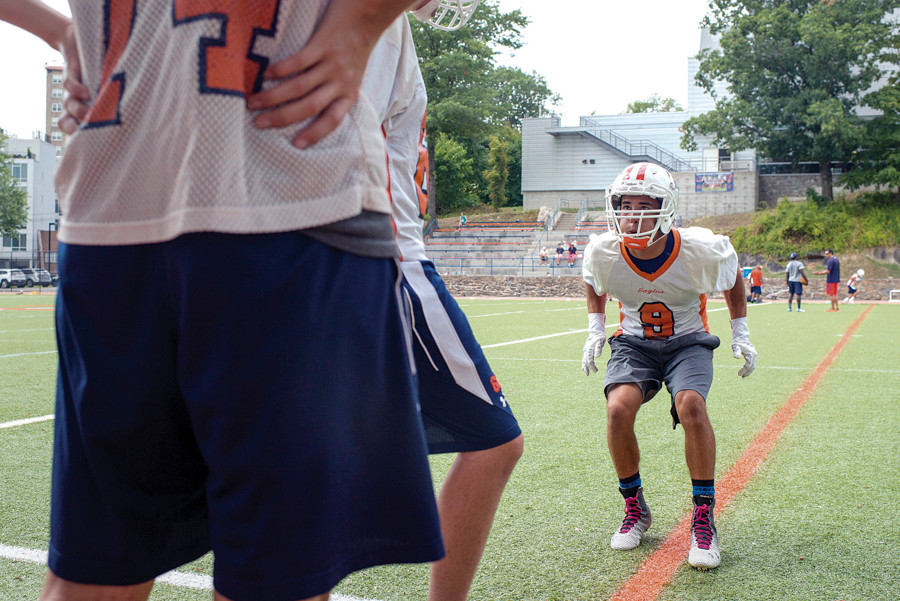Local coaches grapple with concussions
You have seen the headlines, read the stories and listened to the countless news accounts over the past several seasons. Concussions in football have reached epidemic levels and the discussion of how safe football really is has become as much a part of the Sunday NFL game broadcasts as sacks and touchdowns.
Just this past offseason saw a pair of San Francisco 49ers players — Anthony Davis and Chris Borland — retire after suffering concussions. Borland, a budding star, had just played his first and only season in the NFL while Davis, a Rutgers University graduate, cited lingering symptoms from a concussion as a reason for hanging up his cleats at the age of 25.
At the time he announced his retirement last summer, Davis released a statement that said in part, “I’m simply doing what’s best for my body as well as my mental health at this time in my life.”
Concussions and Chronic Traumatic Encephalopathy (CTE), which is defined as a progressive disease of the brain found in athletes with a history of repetitive brain trauma, has also been linked to the suicide deaths of former San Diego Chargers’ Hall of Fame linebacker Junior Seau, former Super Bowl champion Dave Duerson of the Chicago Bears, former Pittsburgh Steelers Mike Webster and Adrian Robinson, former Tennessee Titans wide receiver O.J. Murdock and former Kansas City Chiefs linebacker Javon Belcher, among others.
Given the mounting evidence of concussions and its side effects, how is the situation being handled on the high school level? The Press checked in with two area schools — Clinton and Fieldston — to gauge their level of concern on concussions in football and their protocol in dealing with them.
“When something is at the forefront of the news, it’s being talked about and it’s relevant, you have to pay more attention to it,” Clinton head football coach Howard Langley said. “The PSAL has given us concussion courses that we have to renew on an annual basis. So we’re more aware, we’re more concerned and we’re more alert. You have to be.”
Fieldston coach Gus Ornstein played college football at both Notre Dame and Michigan State and bounced around the NFL with several teams including the Rams, Dolphins and Jets. So he is acutely aware of the prevalence of concussions in the sport. But he is equally confident in how his program deals with the issue.
“Our concussion numbers have been very good, to be honest,” Ornstein said. “We’ve certainly had some kids suffer concussions, but the protocol is always the same. If it happens during a game, they’re immediately taken out and as soon as they come off the field they’re examined by our trainer or doctor. Once any symptoms of concussion are present, they are immediately removed from the game. Then depending on the severity, they are sent to a doctor and then from there you’re really relying on the guidance of the doctors.
“Our role as a school is they will not resume any activities until they are symptom-free for five consecutive days,” he continued. “Once they are, then we’ll start them back on our ‘return-to-play’ protocol, which involves limited cardiovascular endurance activities and increasing that each day as long as there are no symptoms from one day to the next. So on the first day they’ll ride the [stationary] bike, then they’ll walk on the treadmill for 15 minutes and as long as they come back the next day and there are no symptoms, we’ll increase that activity the next day. Once they go through three to five days of that with no symptoms, only then will we return them to practice.”
But a return to practice doesn’t necessarily mean the player is ready to resume game action.
“The return to practice will take place without contact,” Ornstein said. “Before any contact, they take a baseline concussion test online and then when they are symptom-free they will re-take the test so we can compare results. And before they return to any activity, we require a doctor’s note clearing them to come back.”
Technique tweaks
Clinton follows a similar procedure and Langley, like Ornstein, has even taken to teaching his players how to tackle differently so that a player’s head is not involved in as many collisions.
“We’re aware and they are aware of concussions because they watch the news as well,” Langley said. “So in the preseason we talk about our tackling technique and we’ve adjusted it, the head placement on tackles. We teach fundamental tackling where we emphasize leading with the shoulder with the head away from the body. If it’s taught early they get better at it.”
Christian Henry, Fieldston’s senior quarterback, has played four seasons in Riverdale and has never suffered a concussion. Despite all the recent news, Henry doesn’t view the game any differently.
“I just feel those injuries are the product of playing football over a long period of time,” Henry said. “Obviously I think getting a concussion would be bad, but I don’t think getting one would immediately send you down that road.”
But does the spate of news about brain injuries make him second-guess playing football now?
“I feel like it probably should,” Henry said. “But I’ve had so much fun playing football. I’m concerned a little bit, but I try not to think about it. I just think about what’s going on in the game.”
Deon Johnson is a senior linebacker and tight end for Clinton who is getting looks from Stony Brook, Wagner College and the College of Charleston to play on the collegiate level. Like Henry, Johnson hasn’t let the plethora of concussion-related news change his views on the game he loves.
“I keep my head on a swivel and just play,” Johnson said. “I don’t really think about it that much. I just play and if my head hurts, I’ll let the coaches know.”
Johnson said he has never suffered a concussion. But in light of the news about former NFL player suicides brought on by concussions and CTE, he said there should be a limit on the punishment a body can take.
“It’s a little crazy to me that a concussion could cause that,” Johnson said. “I think if you get more than two concussions, you should wrap it up. That’s a lot of shots to the head and that can get serious. Your brain is important.”
Both Langley and Ornstein, like every high school football program, send their helmets out to be reconditioned after each season so that each player receives maximum protection from head injuries.
Langley reports none of his players have endured a concussion this season, while Ornstein currently has one player who has been out for several weeks with one. But Ornstein, who knows the risks of playing a violent game, is confident his program does all it can to keep his players safe.









